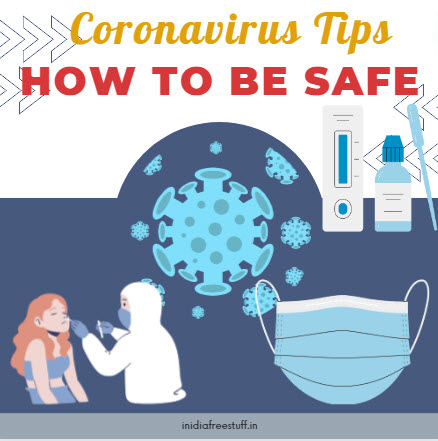The majority of nations have been forced to lock down their cities because of the enormous threat posed by the new coronavirus BF7. It has been suggested that people stay at home, use social distancing, and take care of their cleanliness.
All Indian citizens are now only permitted to leave their homes during emergencies or to purchase necessities due to the countrywide lockdown. This creates new difficulties for grocery shopping at your neighborhood supermarket, grocery store, or mall.
Local government agencies and food companies are discovering innovative strategies to uphold social distancing and personal hygiene. In particular, for 2023, the Centre for Disease Control and Prevention (CDC) provides advice on how to keep safe while shopping for necessities.
Before leaving your house to go for necessities, keep the following in your mind:
- Don't hesitate to replace any food or medication that has expired with new ones. This is not the time to get sick from eating contaminated food or using expired medication.
- Choose home delivery of your groceries if it is a possibility. It will make it easier to avoid long lines at physical stores and any potential personal interaction.
- Avoid purchasing more than two to three weeks' worth of food. This can assist you in keeping food from going bad and posing a health risk.
- Maintaining specific safety standards during these journeys can also significantly reduce any needless chances of infection and assist you.
Things to keep in mind while buying food or groceries
Many people may still be figuring out how to adhere to the necessary precautions while buying food or other necessities in the wake of a new virus being labeled a pandemic. When buying necessities during COVID-19, remember these vital coronavirus safety tips:
1) Points to Remember: Before you read the rules, consider the following before going shopping for necessities:
2) Stay Home If You're Unwell: If you have COVID-19 symptoms or are sick, avoid leaving the house to get groceries or other necessities. Cough, fever, and shortness of breath are among the symptoms that the World Health Organization (WHO) has recognized as indicative of a COVID-19 infection.
3) Dispose of Expiring Foods/Medicines: Expiring foods and medications should be thrown away as soon as possible because they may be a source of food poisoning.
4) Purchase Food for Two or Three Weeks: Try to purchase meals that can only be kept for Two or Three Weeks. By doing so, you can get rid of any potential food expiration and avoid getting sick.
5) Maintain Safety: Keep a certain level of safety standards in mind while you make these journeys to the store to buy necessities. It will assist you to avoid becoming sick and stop any needless infections from happening.
Steps to follow while shopping
Compared to the time before the coronavirus, grocery shopping has changed significantly. You must adhere to certain rules meticulously if you want to lower your risk of catching the new virus. The following rules must be observed for a secure buying environment:
Plan before buying
Plan by creating a list of what is needed for the upcoming day, week, or month so you have it on hand when you decide to go outside to buy groceries. To prevent making many trips to the grocery shop, make a list of everything you intend to buy.
Bring Your Bag
Bring your bag rather than relying on the store to give you one. Try to only leave the house at off-peak times. Make sure you purchase items that will last at least a week or two and are not expired.
Put On A Mask
When you leave the house, wear a homemade mask over your mouth and nose. By doing this, you can avoid breathing in viruses that could spread when someone sneezes or coughs after being infected.
Go Alone
It is simpler to maintain social distance if you travel alone rather than tagging along with others because doing so will put stress on the rules that are enforced in public areas. To maintain a lengthy line, avoid leaving in groups or couples as social distancing makes this harder.
Maintain The 2-Meter Social Distancing Rule
The virus can spread up to 2 meters in droplets or discharges from the mouth or nose released during a cough or sneeze. Make sure to keep 6 feet between you and other customers. Place yourself in line and wait for your turn.
Buy Only What Is Required
Do not hurry to get items that are not necessary. Hoarding food items will cause an imbalance in the supply and demand of products, as there may be others who need them.
Carry sanitizer
Though it might not be necessary, you should think about bringing your disinfectants. You could do this out of an abundance of caution. Using a hand sanitizer can make it easier to clean your hands because you might not be able to wash them all the time when shopping.
Wash Your Hands Often
Hand washing is the most fundamental step you can take to stop the COVID-19 virus from spreading. When you return from your grocery shopping, this is even more crucial. You should wash your hands for at least 20 seconds if you want to prevent getting the virus. Hands should be thoroughly washed with soap and water.
Choose contactless shopping
There are modern payment methods like touchless or contactless machines. This will lessen the need for you to enter your pin manually to complete the payment. If not, be sure you wash your hands or rub alcohol on them to sanitize them.
Getting Deliveries or Takeout Orders
While going outdoors to get necessities may be necessary for you, internet deliveries have significantly improved over the past few years. Whenever possible, try to limit your time spent in public. The following advice will help you stay safe when accepting deliveries or takeout orders-
- Keep Contact to a Minimum: If at all possible, pay online when placing important orders. To the greatest extent possible, try to receive delivery without personal interaction. Request the delivery boy to keep your package outside of your home in a secure location. While gathering the order, try to adhere to the 2-meter distance guideline.
- Wash Your Hands: After accepting the delivery, make sure to wash your hands with soap and water for at least 20 seconds or sanitize them with a 60% alcohol-based hand rub. Infection risk will be decreased as a result.
- Pay Online: It's advisable to pay the bill online as opposed to choosing to pay with cash when the package is delivered. It eliminates the risk of contracting the virus from the delivery person while doing business with them.
Conclusion
You should stay at home if you have a higher risk of contracting COVID-19 new variant BF7. This includes the elderly, particularly those over 65, as well as individuals who have diabetes, heart disease, or lung illness. 2023 will be crucial for your health because of this new variant.
It's necessary to take safety precautions and maintain strict personal hygiene while dealing with a communicable disease like the Coronavirus BF7. This time the rate of transmission and risk of infection are both quite high. You can prevent this infection by being extra precautions and care when you go outside.



















Comments